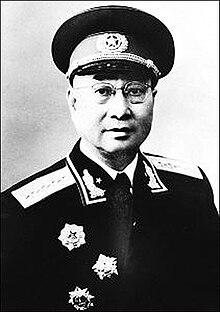Chen Geng | |||||||
|---|---|---|---|---|---|---|---|
陈赓 | |||||||
 Chen Geng | |||||||
| Vice-Minister of National Defense | |||||||
| In office 16 September 1959 – 16 March 1961 | |||||||
| Minister | Lin Biao | ||||||
| Deputy Chief of the People's Liberation Army General Staff Department | |||||||
| In office 31 October 1954 – October 1959 | |||||||
| Chief | Su Yu→Huang Kecheng | ||||||
| President of PLA Military Engineering Institute | |||||||
| In office 11 July 1952 – 16 March 1961 | |||||||
| Preceded by | Position established | ||||||
| Succeeded by | Liu Juying | ||||||
| Political Commissar of PLA Military Engineering Institute | |||||||
| In office September 1953 – May 1958 | |||||||
| Preceded by | Position established | ||||||
| Succeeded by | Xie Youfa | ||||||
| Chairman of Yunnan Government | |||||||
| In office January 1950 – April 1955 | |||||||
| Preceded by | Position established | ||||||
| Succeeded by | Guo Yingqiu | ||||||
| Military Advisor to Democratic Republic of Vietnam | |||||||
| In office 1949–1955 | |||||||
| Personal details | |||||||
| Born | February 27, 1903 Xiangxiang, Hunan, Qing Empire | ||||||
| Died | March 16, 1961 (aged 58) Shanghai, People's Republic of China | ||||||
| Political party | Chinese Communist Party | ||||||
| Spouse(s) | Wang Genying Fu Ya | ||||||
| Children | 5 | ||||||
| Parent(s) | Chen Daoliang Peng Xuexian | ||||||
| Alma mater | Whampoa Military Academy Counter-Japanese Military and Political University | ||||||
| Awards | |||||||
| Military service | |||||||
| Allegiance | |||||||
| Branch/service | |||||||
| Years of service | 1923–1961 | ||||||
| Rank | |||||||
| Battles/wars | Chinese Civil War Second Sino-Japanese War First Indochina War Korean War | ||||||
| Chinese name | |||||||
| Traditional Chinese | 陳賡 | ||||||
| Simplified Chinese | 陈赓 | ||||||
| |||||||
Chen Geng (Chinese: 陈赓; 27 February 1903 - 16 March 1961) was a Chinese military officer who served as a senior general in the People's Liberation Army. Enlisting in a warlord's army at the age of 13, Chen Geng joined the Chinese Communist Party in 1922 and was accepted into Whampoa Military Academy in 1924. He approached Chiang Kai-shek and even saved his life by preventing him from committing suicide. He served as a Communist spy in the National Revolutionary Army for 6 years. After being discovered, he joined the Communist base in Jiangxi and participated in the Long March. He fought the Imperial Japanese Army during the Second Sino-Japanese War and then the Nationalists during the Chinese Civil War. Once victory was obtained, he went to Vietnam to help Hồ Chí Minh against the French during the First Indochina War and then participated in the Korean War with the People's Volunteer Army. He became a senior general in 1955. He then founded an academy of military technologies but died before finalizing the ballistic missile and nuclear weapons programs.